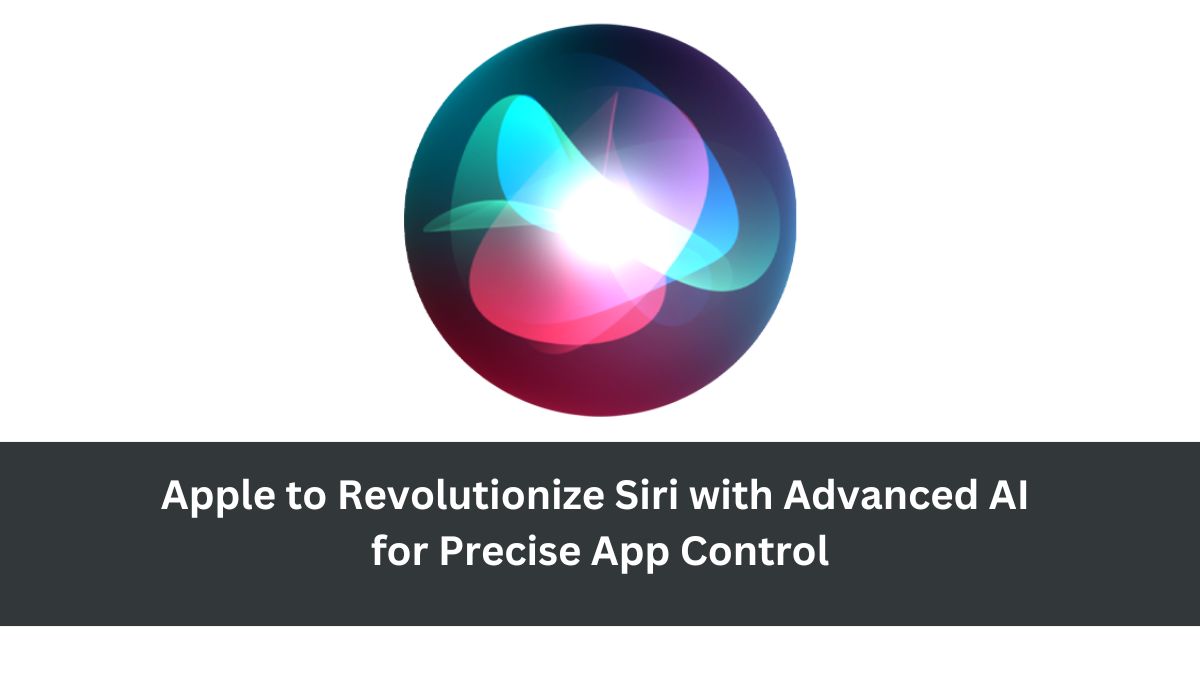AI
Apple to Revolutionize Siri with Advanced AI for Precise App Control

Apple Inc. is poised to transform its virtual assistant, Siri, with advanced artificial intelligence (AI) capabilities. According to sources reported by Bloomberg, this significant overhaul will enable users to control individual app functions with their voice, marking a substantial leap forward in Siri’s functionality.
The New AI Overhaul for Siri
Apple’s virtual assistant, Siri, is set to receive a groundbreaking upgrade, leveraging advanced AI to enhance control and precision in navigating iPhone and iPad applications. This update will enable Siri to command all app features for the first time, revolutionizing how users interact with their devices.
The overhaul involves a complete revamping of Siri’s underlying software using large language models, a core technology behind generative AI. This change is a part of Apple’s renewed push into AI, aimed at enhancing user experience and maintaining the company’s competitive edge in the rapidly evolving tech landscape.
Apple’s Broader AI Strategy
The Siri upgrade is a component of Apple’s larger AI strategy, which will be unveiled at the Worldwide Developers Conference (WWDC) on June 10. According to Bloomberg, Apple is preparing several new features, including voice memo transcriptions and summaries, quick recaps of websites and notifications, automated message replies, advanced photo editing, and AI-generated emojis.
In addition to these features, Apple is negotiating a deal with OpenAI to integrate its chatbot and other technologies into the iOS operating system. The company is also in talks with Google parent Alphabet Inc. about potentially using its Gemini software in the future. Apple software chief Craig Federighi has instructed his teams to develop as many new AI features as possible for this year’s operating system updates.
Enhanced Precision and Functionality
Siri’s new AI capabilities will be a focal point of the WWDC unveiling. The updated system will allow Siri to control and navigate an iPhone or iPad more precisely. For example, users will be able to open individual documents, move notes to different folders, send or delete emails, open specific publications in Apple News, email web links, and ask for article summaries.
Currently, Siri is limited to broader commands like playing music playlists, looking up information, or controlling smart home appliances. Although Apple introduced Siri Shortcuts in 2018, which lets users manually create commands for app features, the new system will go further. It will use AI to analyze user activities and automatically enable Siri-controlled features, initially focusing on Apple’s apps.
Future Enhancements and Privacy Concerns
The new Siri system is one of Apple’s more complex AI initiatives and isn’t expected to be released until next year as part of a subsequent update to iOS 18. The first version of the new operating system will launch in September, coinciding with the next iPhone models. Initially, Siri will handle one command at a time, but Apple plans to allow users to chain commands together in the future. For instance, users could ask Siri to summarize a recorded meeting and text a colleague in one request.
A significant component of this new push is a system that will use AI to determine automatically whether a function should be handled on the device or via the cloud. This approach, while innovative, raises some privacy concerns. On-device tasks won’t share personal information, but cloud-based tasks will require some user data to be transferred to remote servers. Apple has pledged to secure this data using the Secure Enclave in high-end Apple Mac chips powering the data centers.
To reassure customers about their data privacy, Apple plans to create an “intelligence report” explaining how the information is secured. The company has also vowed not to build profiles of customers, a practice it has criticized competitors like Google and Meta Platforms Inc. for engaging in.
Revitalizing Siri and Encouraging Device Upgrades
Apple aims to revitalize Siri, a pioneering product that has lagged behind competitors’ services in recent years. Launched in 2011, Siri initially gave Apple an early lead in voice-based interfaces and AI. However, Apple soon lost that lead to Amazon’s Alexa and Google Assistant and was caught off guard by the emergence of generative AI chatbots two years ago.
With these new AI features for the iPhone, iPad, and Mac, Apple hopes to encourage users to upgrade their devices. Many on-device AI capabilities will require an iPhone 15 Pro or later to function, while Macs and iPads will need at least an M1 chip. This strategy not only aims to enhance user experience but also to drive sales in a competitive market.
Embracing AI for the Future
Apple’s upcoming AI enhancements signify a bold step forward in the integration of advanced technology into everyday user experiences. By enabling precise control of individual app functions through Siri, Apple is set to revolutionize how users interact with their devices. This transformation is part of a broader AI strategy that promises to keep Apple at the forefront of technological innovation.
As Apple prepares to unveil these advancements at the WWDC, the tech community and consumers alike eagerly anticipate the potential changes. These developments underscore the importance of embracing AI to stay competitive and enhance user experiences in an increasingly digital world.
In conclusion, Apple’s ambitious AI plans for Siri and its devices represent a significant leap forward. As these features roll out, they are expected to not only improve functionality but also address privacy concerns, ensuring a secure and seamless user experience. This evolution in AI technology reaffirms Apple’s commitment to innovation and its role as a leader in the tech industry.
